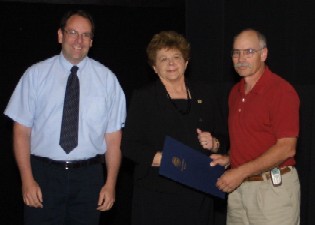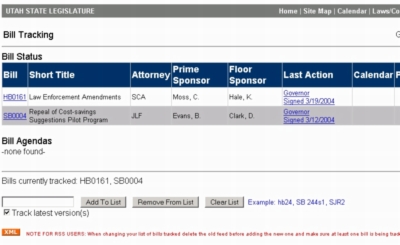Most states currently do not provide constituent service blogs for their legislators. One reason is the fear that blogs can be misused. Legislative staff make every effort to offer non-partisan services and information and fear that blogs could be used as state sponsored tools for campaigning.
Most U.S. Representatives and Senators have both official governmental websites and private sites for operating campaigns. The question is, could state governments promote a similar dual model of separate sites/weblogs for constituent services and campaigning?
Elected officials and those running for office have seen how RSS news syndiction can help them spread their message. Howard Dean rose out of obscurity last year using a combination of weblogging and local web meetups to become his party's front runner in the presidential race. Dean and others learned that this technology can even the playing field and allow someone to rapidly organize a grass roots campaign. RSS syndication can help create a dynamic website and produce both email and online newsletters in the same process. With legislative staffs slow to offer the service, there is an inviting market niche for the private sector.
Recognizing this golden opportunity, LaVarr Web, Publisher of UtahPolicy.com today issued an "Invitation to Blog" to elected officials and party leaders wishing to communicate directly to citizens. Mr. Webb writes:
We would like to invite you to become a blogger. UtahPolicy.com is creating the Utah Policymaker Blog and we hope you will be part of it. It is an opportunity for you, as a Utah policymaker, to publish your opinions, thoughts and ideas to a wide audience of opinion leaders. It is an opportunity to participate in an exciting new high-tech communications medium that is becoming a powerful tool in politics, business and in every walk of life.
It's fun and exciting to be a blogger. You are probably aware of how bloggers are credited for toppling the powerful Dan Rather and CBS News. The phenomenon of blogging is growing rapidly and as a leader in Utah you ought to become familiar with this new method of communicating and use it to your advantage. In effect, Utah policymakers will have their own electronic publication in which to communicate with the public.
Some reasons UtahPolicy.com offers as to why elected officials ought to consider blogging include:
Utah policymakers interested in the offer should send an e-mail expressing their interest to
This is an example of the union of business and government to promote democracy and inform the citizenry using RSS news syndication. We wish them well in their efforts!
The National Association of Legislative Information Technology (NALIT) will be sharing "Web Tips, Tricks and Techniques" for building Legislative RSS feeds at their 2004 Professional Development Seminar in beautiful Burlington, Vermont, September 8-11, 2004. Panelists include key IT players from Virginia, Nevada, and Utah. Several states are now using RSS to provide users with notices of new Web content or to distribute newsletters. At least two states are now generating legislative feeds directly from databases. This article previews some of what they'll be showing from the states of Texas, Utah, Wisconsin, and Rhode Island.
NALIT is the IT working group of the National Conference of State Legislatures. The recent annual meeting, July 19-23, 2004 in Salt Lake City, was hosted locally by Mark Allred and his IT staff from the Utah Office of Legislative Research and General Counsel. Marty Stephens , Speaker of the Utah House of Representatives and President of the National Conference of State Legislatures, presided. Linda Pittsford, Manager of the Texas Legislative Council Computer Center, gave a presentation introducing "Leveraging RSS Technology" for searching news.
This time around panelists Sharon Crouch Steidel, Director of Information Systems, House of Delegates, Virginia and Andy Harvey, Webmaster and Internet Services Administrator of the Nevada Legislative Counsel Bureau, will examine how to make news available via syndication, which RSS format to choose, and other tips and potential uses for RSS by legislatures.
Glen Johnson, Utah Office of Legislative Research and General Counsel, will then demonstrate how the Utah Legislature is using RSS. Glen has created a legislative news feed and Brooke Anderson, a programmer with the Legislative IT Staff, has tied into the Legislature's SQL database to provide RSS feeds for bill tracking and committee calendaring.
 Brooke and Mark Allred recently received the Utah 2004 CIO Award for Digital Democracy from Governor Olene Walker for their "Online Tracking of Legislation" system. This utility made tracking the 693 bills and resolutions of the 2004 session a more managable task. The RSS syndication features have been added since the award.
Brooke and Mark Allred recently received the Utah 2004 CIO Award for Digital Democracy from Governor Olene Walker for their "Online Tracking of Legislation" system. This utility made tracking the 693 bills and resolutions of the 2004 session a more managable task. The RSS syndication features have been added since the award.
The bill tracking facility now creates custom feeds for the bills of interest to the user. The feeds provides links to the bill text, sponsor, bill status, floor calendars, and relevant committee agendas and minutes.

The legislative committee watch list provides a check list allowing users to pick and choose committees of interest. For example, if you wanted to keep informed about interim committees in between legislative sessions, you could select just those, and it creates a custom feed linked to by the orange xml icon at the bottom of the page ![]() . The feed that you receive provides up-to-date links to agendas, minutes, and committee documents.
. The feed that you receive provides up-to-date links to agendas, minutes, and committee documents.
RSS innovations from other states that will be showcased at the NALIT seminar include:
Texas
The Texas Legislative Counsel has created RSS feeds for upcoming legislative calendars, committee meetings, schedules, and feeds for bill text, fiscal notes and analysis,